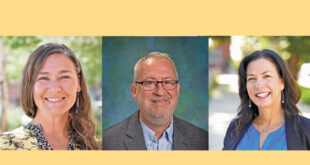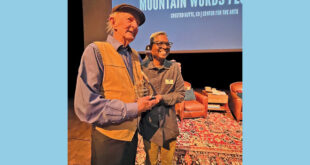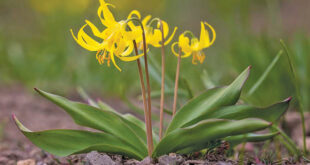Next trip to include dental care in 2023
[ By Katherine Nettles ]
his past fall, as most residents of the Gunnison Valley were getting in their last camping trips, bike rides and firewood collections ahead of winter, a group of eight local community members headed south to Central America instead. The journey was not just about chasing warmer weather, but lending help to a nonprofit organization in Guatemala’s volcanic Lake Atitlan Basin that serves an indigenous Mayan population in a variety of ways. This year, the group helped with new home construction for a woman and her four children. And next year another trip there will include several more participants and a local dental practice.
Serving “the lost, the least and the last” is the prevailing description of the nonprofit organization, named Porch de Solomon, with whom several Crested Buttians have formed close ties over the past seven years. Modeled in the spirit of the Biblical story of Salomon’s Porch, the organization opened in 2005 focusing on indigenous home construction, educational scholarships, outreach and sustainable economic development and humanitarian relief.
Crested Butte Union Congregation Church’s associate pastor Kelly Jo Clark and resident Tom Stumpf have made several visits to Porch de Salomon over the past decade, and this time were joined by Matt Barker, Jim Withe, Ian Wrisley, Katherine Keller and Bill and Carol Kastning as part of a short-term service team to help in indigenous home construction.
The trips had been postponed by COVID and this was the group’s first trip there since 2019. But Clark says that they have done both the medical clinics and construction projects during different visits.
“In the past we’ve taken a doctor or two, plus a nurse or some other medical assistant type person,” says Clark. Through Porch, the team has run medical clinics in the remote regions near Panajachel. “We take the medical team and translators that Porch provides. And Porch has alerted the elders of the town in advance that we’re going to be there, because some of the people never get to see a doctor.”
Clark says they usually set up in an available facility, spend a day doing triage for as many as 200 people, sending each away with medications or supplies as needed and for those in need of more extensive care, they coordinate this through Guatemalan doctors. “And Porch is critical on following through on that,” says Clark.
The mission
Wrisley, a local carpenter and Gunnison Congregational Church pastor, joined the team for the first time this year and shared his experience helping to create housing alongside local contractors for residents in need. They stayed at a nearby hotel the organization operates called Hotel California and worked alongside local contractors.
“I am sometimes a little bit skeptical of mission work,” Wrisley says frankly. “It can seem a little bit patriarchal and objectifying.”
Wrisley says he found Porch well balanced in that the organization does not try to convert those who participate in or benefit from its work and that it brings visitors into a system as helpers but not to influence anyone.
Clark notes that there are many powerful ways the population has kept its heritage intact, which is honored. “They’ve been able to keep over 15 Mayan languages around the lake,” she says, and traditional Mayan clothing is worn almost exclusively, especially among women.
Wrisley says in keeping with indigenous practices and the realities of the area’s remoteness, the team was instructed not to bring their own tools except for maybe a favorite hammer.
“I think the thing to do is enter into the way things are,” he says. “So everything can’t be done the way it would be done here.” For example, instead of using excavators or other heavy construction equipment so common in the U.S., the group was digging a septic system and leach field by hand and moving cinderblocks one by one along dirt roads and through tall rows of cornfields.
Wrisley said it formed more of a human connection. “We dug a hole from about two feet deep to about 10 feet deep. And we only had a seven-foot ladder to get out,” he describes, remembering the comical process of pulling one another out of the hole toward the end.
After seeing various projects and even attending a ceremony for another home that had just been completed, Wrisley summarizes, “The houses are well-built, legally compliant structures. It’s not just a way of giving American do-gooders something to do.”
Wrisley says the organization seems to function well as an integrated part of the community. And the experience sparked his curiosity, as he wanted to learn more about the local history and how the socioeconomic realities there evolved to leave the oldest, most indigenous population the least prosperous.
Wrisley said it was a fulfilling way to travel, as well, from gorgeous scenery and a sense of “eternal spring,” to learning new things (such as spinning and dying yarn and how to weave textiles).
“It’s not overly curated but it isn’t too open-ended in terms of what you can do. It’s an opportunity to see that part of the world and an opportunity to do something for people that isn’t going to be in the wind,” he says.
“If you’re going to travel anyway, you might as well do something useful for other people. They [Porch] did a good job of creating both a vacation and arranging our help.
If you have things, I think you should give them away. Whether that’s energy, or time. Try to experience where other people are,” says Wrisley.
Clark agrees, saying the reason she keeps going back is that it is a beautiful and fulfilling experience. “Anyone we take on our trip comes back more gifted somehow by the people there. We got more out of it than we gave,” she says. “My goal is to do those sorts of things and do other things to help create systemic change. Because we know these are one-offs.”
Next up, dentistry
And for the first time ever, the team is planning a dental clinic for 2023. Local dentists Chelsea and Dave Stengl will be bringing a whole team and some family members with them next October.
“Dave and I did a service trip to Ecuador when we were in dental school together,” says Chelsea. But that was in 2009, and she says they are ready to get back into it. “We were super excited to be able to connect with somebody that is doing the trip already…and the group that they go with already has a set up to be able to do dentistry,” she explains. This includes dental chairs, generators, and hand pieces (drilling instruments).
“To be able to bring dentistry to a place that has none is a huge win,” says Chelsea, who expects to be able to take about 20 people including three dentists, three hygienists, assistants and some family members. “Anyone from our team who wants to go will be able to go…Our hope is we’ll be able to fundraise to cover the majority of the cost for team members,” she said.
“We should be able to do fillings, extractions and hygiene, which is periodontal care. Periodontal care is so important because that is linked to so many diseases,” she reflected.
“And a huge piece is education. In many third world countries there is an excessive amount of candy. So auxiliary staff can do more of the education and outreach. Also helping sterilize our equipment, whatever else can be done.”
Fundraising for the group will kick off in April after the attendees are confirmed and will be used in part to bring along supplies like toothbrushes, toothpaste and flouride.
The Stengls will bring their two children, who are both in primary school. “It will be a nice way to expose our kids to what the rest of the works looks like and in a positive way, showing them how we are able to make a difference,” says Chelsea.
“And we have such a great team at our practice. I can’t imagine a better team to be able to go do this service practice with,” she adds. “I’m so grateful to Kelly Jo, who made the whole thing so easy by putting us in contact with everyone.”
 The Crested Butte News Serving the Gunnison Valley since 1999
The Crested Butte News Serving the Gunnison Valley since 1999





